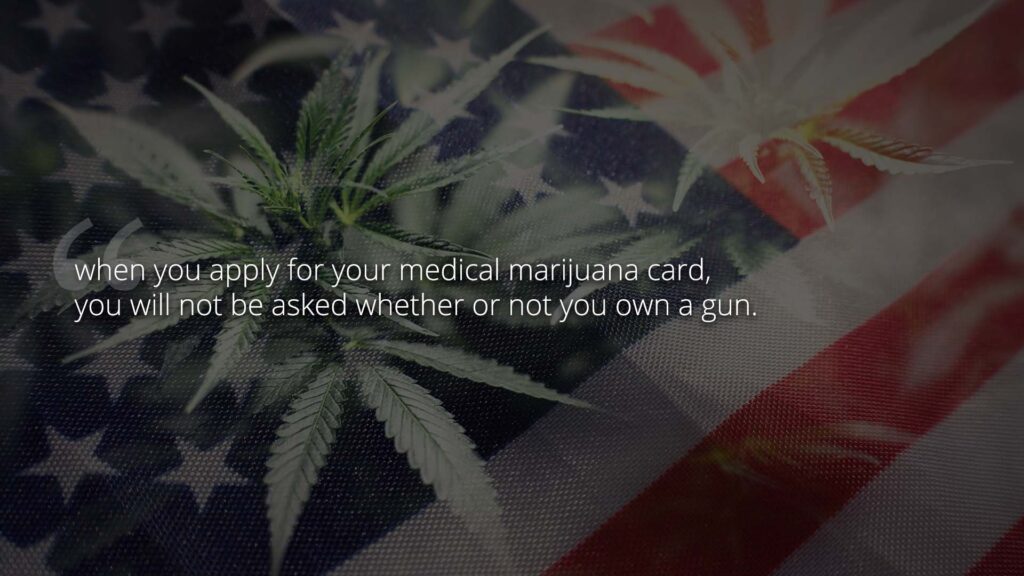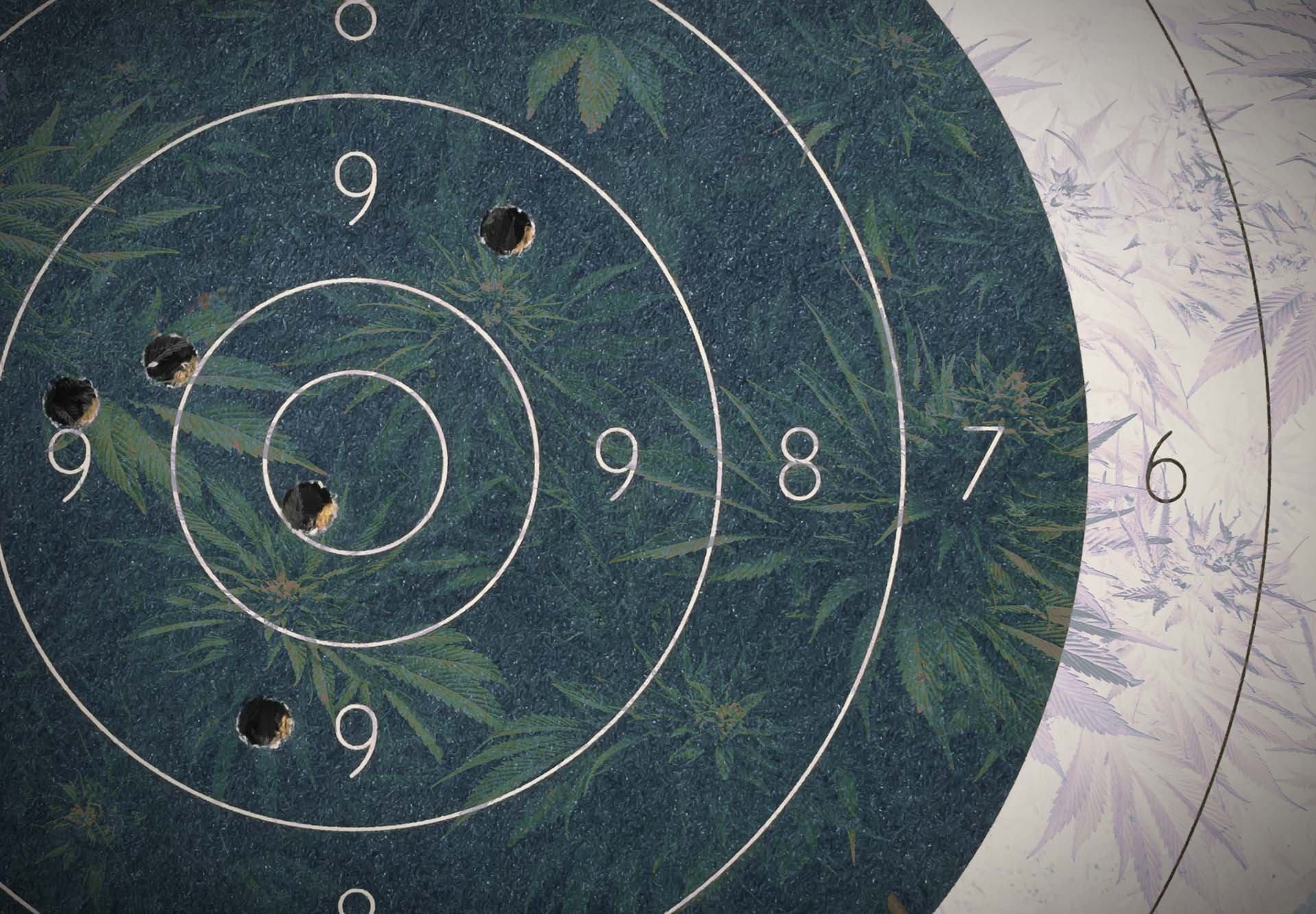48.8% of residents in the “Show Me” State own guns, ranking Missouri 20th in the nation in terms of gun ownership.* With nearly half of the state’s residents exercising their right to keep and bear arms, some of the questions most commonly asked by medical cannabis patients in Missouri are: “can I purchase firearms if I am a medical cannabis cardholder?” And, “if I am already a gun owner, am I required to surrender it?”

In this article we will explore the nuances of Missouri law and federal regulations regarding guns and medical cannabis use. In Missouri, if you become a medical cannabis cardholder, you will not be able to purchase any firearms from a federally licensed gun dealer or other source of firearm sales. However, you are not required to surrender any guns currently in your possession.
It may seem unfair to be denied the same rights as every other gun owner across the country when you live in a state where medical cannabis is legal. But, because medical cannabis is still illegal on a federal level, Missouri lawmakers must follow federal law.
Once cannabis becomes legal on a federal level, you will be able to purchase firearms.
Federal Law: Firearms and Medical Cannabis Usage
According to a memo issued in 2011 by Arthur Herbert, assistant director of Enforcement Programs and Services at the Bureau of Alcohol, Tobacco, and Firearms (ATF), federal law prohibits anyone who is an “unlawful user of, or addicted to any controlled substance, from shipping, transporting, receiving or possessing firearms or ammunition.”
The assistant director also said that “marijuana is listed in the Controlled Substances Act as a Schedule I controlled substance, and there are no exceptions in federal law for marijuana purportedly used for medicinal purposes, even if such use is sanctioned by State law.”**
ATF Form 4473, the Firearms Transaction Record
If you are a Missouri resident who owns a gun, you know that when you buy a firearm from a federally licensed gun dealer, you are required to fill out ATF Form 4473, the Firearms Transaction Record.
Question 11.e on this form asks: Are you an unlawful user of, or addicted to, marijuana or any depressant, stimulant, narcotic drug, or any other controlled substance?
If you answer yes to question 11.e, regardless of if it is for medicinal purposes, your application will be denied.
Now, if you are a MMJ card holder in Missouri, you are a lawful user of cannabis in the eyes of local and state authorities. But, in the eyes of the ATF and other Federal agencies, you are considered an unlawful user since the use or possession of cannabis is illegal under federal law. So, if you answer no on this ATF form, you’ll be committing perjury, which is a federal crime.
Do I Have To Surrender My Firearms If I Get A Medical Cannabis Card?
If you are a Missouri resident who already owns a gun, things are not so clear cut.
Technically, the Second Amendment protects gun ownership and you will not be required to give up your firearms. Plus, when you apply for your medical marijuana card, you will not be asked whether or not you own a gun.
So, if you already own a gun, you could apply for a medical marijuana card and be okay as far as state laws go. But you will still be in violation of federal law, since cannabis is still considered a Schedule 1 Substance.
Missouri’s Second Amendment Preservation Act
Missouri’s House Bill 85 & 310, known as the Second Amendment Preservation Act, was approved by the Missouri House of Representatives in May of 2021 and signed into law on June 12, 2021 by Governor Parson. Although it does not specifically mention cannabis use, it does set limits on the enforcement of federal gun laws against law-abiding citizens in Missouri.
According to the language in the bill, since MMJ card holders in Missouri are law-abiding citizens, they should be able to legally own guns. This bill was created to help protect the gun rights of medical marijuana patients.
Not only does this bill prevent the law enforcement officers in Missouri from enforcing federal laws that restrict the right for Missouri residents to own guns outside the scope of state laws. The bill even includes stiff fines for law enforcement officers or agencies who violate residents rights.
So, where does that leave Missouri residents?

As we mentioned earlier, things are not so clear cut. The Supremacy Clause of the United States Constitution states that when state law conflicts with federal law, federal law takes legal precedence. This is why the ATF and other Federal Government agencies maintain that Missouri’s Second Amendment Act is invalid.
So, since outdated Federal government laws continue to classify cannabis as a schedule 1 substance with “…no accepted medical use…”, no U.S. citizen who currently holds a medical marijuana card can legally own a firearm.
How Often Is The Gun Law Enforced?
Some of you who already own a gun and would like to explore the medicinal potential of cannabis might be wondering, “how often is this federal law enforced on the state level?”
Although we in no way condone the violation of any law, we thought it would be interesting to consider how often this law is enforced.
In addition to Missouri’s Second Amendment Preservation Act there is another piece of legislation that was approved in 2014 which protects individuals and businesses from being prosecuted at a federal level, when they are acting within the boundaries of the state laws.
The Rohrabacher-Blumenauer Amendment was created to address between state and federal laws when it comes to the legalization of cannabis. This amendment prohibits the use of federal funds to prosecute medical cannabis card holders in states where medical cannabis use is legal.
So, with no available funds to check the records of medical cardholders against those of firearm purchases, the likelihood of federal enforcement seems low. Something else to consider is that there is very limited coordination between federal and state authorities regarding Form 4473 which goes directly to the Department of Justice.
When in Doubt Speak with an Attorney
It is important to note that laws and regulations can and will change. The information presented in this document is intended to provide readers with the understanding to make informed decisions.
As of now, Federal laws continue to ignore research recognizing the medicinal value of cannabis in the potential treatment of pain, nausea, tremors associated with Parkinson’s disease, fibromyalgia, PTSD and many other serious medical conditions–in a much safer way than opiates.***
So, until outdated Federal laws catch up with modern science – we can not say with any degree of certainty that you can have a Medical Marijuana card and own a gun in Missouri.
With that said, if you are a Missouri resident interested in exploring the healing potential of medical cannabis, along with your Second Amendment right to bear arms, you should consult with an attorney licensed in the state of Missouri, so you can fully understand your rights and the potential legal consequences of doing so.
If you would like to learn more about the potential health benefits of cannabis click here.
*https://www.cbsnews.com/pictures/gun-ownership-rates-by-state/32/
Cited Sources
**https://talkbusiness.net/2018/11/law-bans-gun-sales-to-medical-marijuana-users-but-will-it-be-enforced/
***https://www.health.harvard.edu/blog/medical-marijuana-2018011513085#:~:text=The%20most%20common%20use%20for,Americans%2C%20especially%20as%20they%20age
No Legal Advice or Attorney-Client Relationship.
The information and/or materials provided herein have been prepared for general informational purposes only and are not intended to constitute legal advice under any circumstance. Any information provided is not intended to, and does not create or form an attorney-client relationship, and receipt of any such information does not create an attorney-client or confidential relationship. The informational materials provided herein are not intended to constitute advertising, solicitation or legal advice in any respect.
We do not warrant or guarantee the accuracy, completeness, adequacy or timeliness of any information contained herein, including any links to third-party websites provided. You should not act or refrain from acting based upon, or rely upon the information contained herein without first seeking legal advice from competent counsel licensed to practice in your relevant jurisdiction. Only your individual attorney can provide assurances regarding the applicability and/or interpretation of any information provided herein to your particular situation or legal matter.
We expressly disclaim any and all liability with respect to actions taken or not taken based upon the contents of this publication or any other publications contained herein. The content is provided on an “as is” basis and no representations have been or are made that the content is free of any errors.
The choice of a lawyer is an important decision and should not be based solely upon advertisements.

